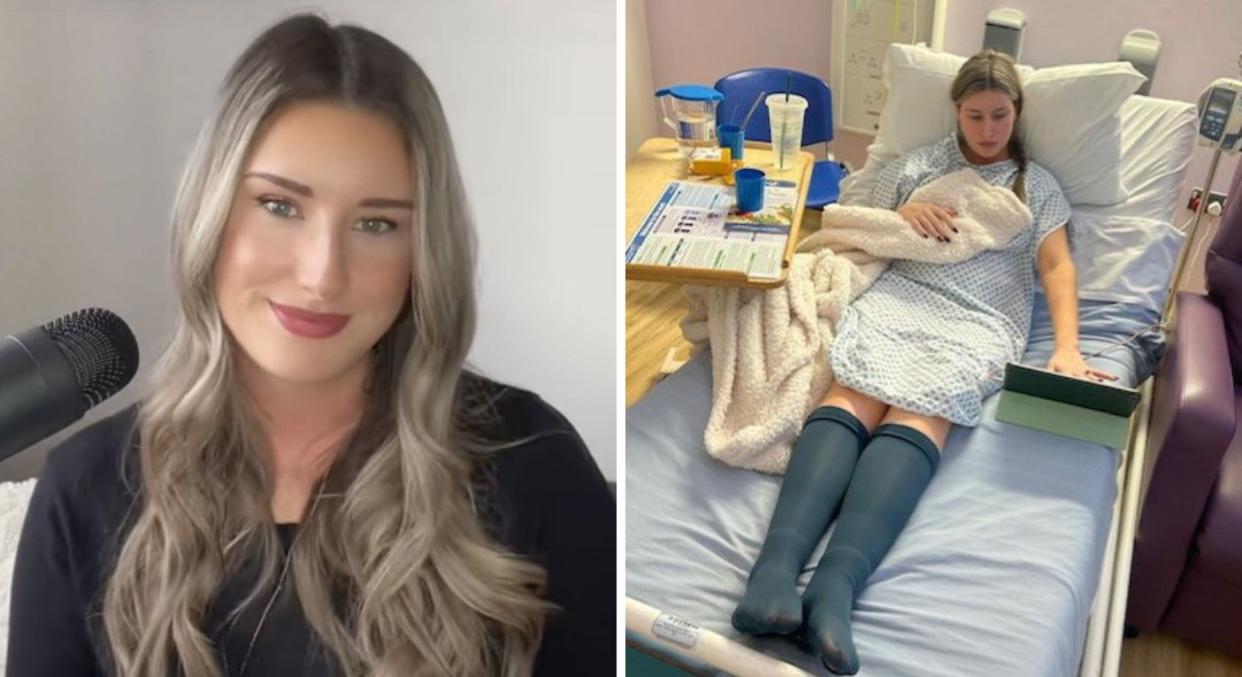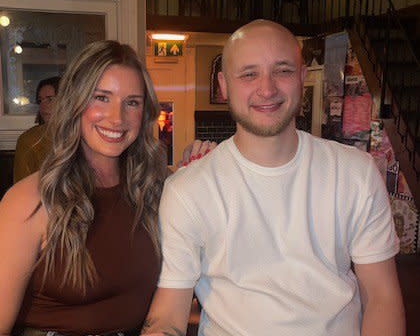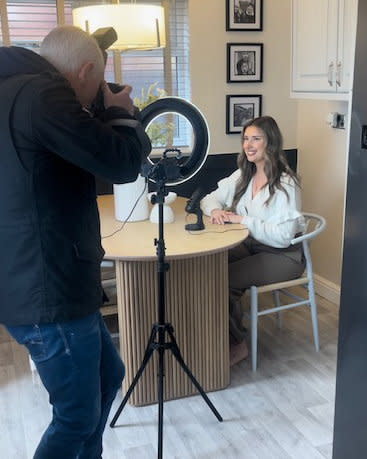‘I had an 80% chance of dying after surprising ectopic pregnancy symptoms’

A woman has told how doctors warned there was an 80% chance she may die after surprising symptoms revealed she was experiencing an ectopic pregnancy.
Just a few weeks after finding out she was pregnant, Natalie Stapley Cutting, 26, from Newark, Nottinghamshire knew "something was definitely wrong."
Seven weeks into her pregnancy she noticed a persistent tingling in her right thigh, coupled with some numbness and a stabbing pain in her right side.
Though her 12-week scan was coming up Natalie decided to visit her GP early to chat through her concerns.
Even though she says her GP wasn't concerned, the military make-up artist decided to pay £90 for a private scan, which revealed an ectopic pregnancy.
She had life-saving surgery to remove the fertilised egg, the right fallopian tube and part of her uterus lining and is sharing her story o urge women to trust their own bodies and always get a second opinion if they are in doubt.
Natalie and her husband, Tom Cutting, 27, who works as a mechanical technician, found out they were pregnant on December 6, 2023.

Despite her GP initially believing that her pregnancy was proceeding normal, Natalie remained convinced that something wasn't quite right, so booked a private scan for December 16.
“They found my uterus was empty," she says.
“As a private clinic, they couldn’t offer a diagnosis but recommended we go to King’s Mill Hospital immediately.”
Natalie underwent her first exploratory surgery on December 18, which detected the fertilised egg in her right fallopian tube - growing into her uterus lining.
An ectopic pregnancy occurs when a fertilised egg implants itself outside of the womb, usually in one of the fallopian tubes, which connect the ovaries to the womb.
If the fertilised egg is found here it is unfortunately not possible to save the pregnancy and the growing tissue poses a danger to life if left untreated.
On December 19 Natalie had surgery to remove fertilised egg and had to sign a waiver concerning the risk of death.
Thankfully, Natalie recovered from the surgery, but now wants to share her story to help others and raise awareness of the risks.

She has also set up a podcast called Ectopic Pregnancy and Me on TikTok to hopefully help "save lives".
"I wanted to create a community to support those suffering from an ectopic pregnancy and the mental health effects afterwards," she explains.
“I found a lot of support through the Ectopic Pregnancy Trust but in terms of aftercare there was no one really to talk to about concerns.
“I thought I would set up a community where people could help each other.”
Natalie now wants to encourage women to trust their own instincts and seek a second opinion.
“Women know their bodies best,” she adds.
“If I hadn't listened to my body I don’t know where I’d be today.”
What is an ectopic pregnancy?
The NHS describes an ectopic pregnancy as when a fertilised egg implants itself outside of the womb, usually in one of the fallopian tubes.
Unfortunately, it's not possible to save the pregnancy and it will usually have to be removed using medicine or an operation.
In the UK, around one in every 90 pregnancies is ectopic, which works out at around 11,000 pregnancies a year.
The NHS lists symptoms of an ectopic pregnancy as a missed period and other signs of pregnancy; tummy pain low down on one side; vaginal bleeding or a brown watery discharge; pain in the tip of your shoulder; and discomfort when going to the loo.
But an ectopic pregnancy doesn't always cause symptoms and may only be picked up during a routine pregnancy scan.
If symptoms are present they tend to develop between the 4th and 12th week of pregnancy.
It is also worth noting that symptoms of an ectopic pregnancy aren't necessarily a sign of a serious problem and can sometimes be caused by other problems, for example a stomach bug.
There are three main treatments for an ectopic pregnancy, according to the NHS:
expectant management where doctors monitor you before administering the treatments below if the fertilised egg doesn't dissolve by itself.
medicine – used to stop the pregnancy growing
surgery
Contact your GP or call NHS 111 if you have a combination of any of the above symptoms and you might be pregnant – even if you haven't had a positive test.
An ectopic pregnancy can be serious, so it's important to get advice right away.
Call 999 for an ambulance or go to your nearest accident and emergency (A&E) department immediately if you experience a combination of:
a sharp, sudden and intense pain in your tummy
feeling very dizzy or fainting
feeling sick
looking very pale
These symptoms could mean that your fallopian tube has split open (ruptured).
Additional reporting SWNS.
Read more real lives:
'I lost 7.5st after getting out of breath going to the toilet' (Yahoo Life UK, 5-min read)
‘I looked 9 months pregnant but it was a sign of ovarian cancer’ (Yahoo Life UK, 6-min read)
‘After bleeding on a restaurant floor I finally found out the real cause of my extreme periods’ (Yahoo Life UK, 5-min read)


